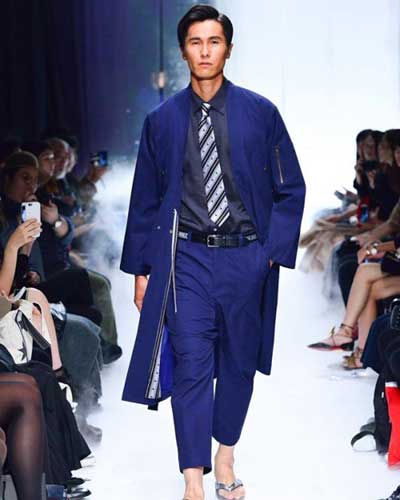FW
Wool Round Table will be held in South Africa from December 7 to 8, 2017. Organised by the International Wool Textile Organisation, it will look at how the industry can protect wool’s environmental credentials and how wool can supply solutions to retail’s responsibility needs. Experts will shed light on current reports about textile sustainability, wool’s role in protecting its environmental credentials and how the industry can manage its resources to the benefit of the entire wool pipeline.
The wool industry has been proactive in ensuring complete transparency in the growing of wool. Numerous certificates of origin are available to buyers, complete with full detail of how the wool was grown and harvested.
The need for wool education is becoming increasingly important. Sustainability isn’t just a buzzword in the industry. Care for sheep and the land they live on are a part and parcel of best practices in wool production. Throughout the cycle of lambing, shearing, and protecting from pests and predators, wool growers are encouraged to care for their flocks, preserve their precious land resource and bring about a healthy yield of new wool each year.
IWTO is the recognized global authority for standards in the wool textile industry. Since 1930, IWTO has represented the interests of the wool textile trade at a global level. Its worldwide membership encompasses the entire wool textile pipeline, from farm to retail.
Amazon Fashion Week Tokyo was held October 16 to 22, 2017.
The menswear collections on display appeared to be marching in step with a global push toward irony-drenched street wear.

Given Tokyo’s formative role in defining the term in the ’90s, it represents something of a homecoming, and a number of brands are fighting to lay claim to the street wear throne now that the old guard has fallen from favor.

Takahiro Miyashita brought his solo project The Soloist back to the runways for the first time since 2009. The Tokyo show allowed him to play to current street wear tastes — patches, logos, graffiti and transparent plastic tech-wear — bringing the collection in line with a new generation. Miyashita’s fans may have been worried by the first couple of garments he presented on the runway, but by the time raw-edged western shirts and dense rock ‘n’ roll-inspired embroidery made appearances toward the end of the show, the sense of relief in the room was palpable.

Akiko Koba aims to support Japanese craftsmanship by using traditional woven silk fabrics in her collections. For her first presentation during Tokyo Fashion Week, she showed tailored suits and preppy cuffed shorts and polo shirts for men, and short suits, tweed jackets, and swing dresses for women. While the silhouettes have been seen countless times before, the textiles were beautiful.

The textile sector has got some relief as GST on yarn has been reduced from 18 per cent to 12 percent. Basic customs duty has been increased by 25 per cent to curb imports of undervalued fabrics from China. Filing GST returns has been simplified.
However, the sector feels more needs to be done. For instance, there was no need to reduce GST on yarn to 12 per cent when weavers will not be able to utilize the accumulation of input tax credit. Traders, embroidery unit owners and lakhs of women associated with the embroidery business are unhappy with the five per cent GST. Textile traders from Rajasthan want the GST on manmade fabrics to be scrapped.
In Gujarat, the weaving sector is observing a month-long Diwali vacation. Most small weaving units may never open and around 70 per cent of the textile shops are shut. Many weavers have elementary education. They have to fill forms, observe procedures and other formalities. So far they have been only accustomed to direct selling, either to the regular trader or a customer, and have not dealt with paper work of any sort. Though silk and jute remain at zero per cent, synthetic fiber yarn gets taxed at 18 per cent.
An Oeko-Tex label will be affixed to the men’s dress shirts of brands like Calvin Klein, Tommy Hilfiger, Van Heusen, Izod, and Arrow. These brands are a part of PVH, one of the largest apparel companies in the world. The Oeko-Tex label will appear in more than 25 million garments to be sold in stores and online by major retailers in North America, such as Macy’s, Kohl’s, JCP, Belk, and Amazon. The label communicates corporate commitment to product safety, chemical management, and quality.
Since consumers prefer dress shirts that are tested for harmful chemicals and considerately made, PVH, an industry leader in corporate responsibility, is committed to the responsible production of high quality products. The Standard 100 by Oeko-Tex certification will help it address both of these goals within its dress shirt business and the sewn-in labels communicate this significant commitment to consumers.
Oeko-Tex provides standardized solutions which optimize customers’ manufacturing processes and help deliver high quality, more sustainable products. Some 10,000 manufacturers, brands and retailers in almost 100 countries are working with Oeko-Tex to ensure their products are tested for potentially harmful substances. Millions of consumers around the world look for Oeko-Tex labels before making buying decisions.
Huntsman Textile Effects is a provider of high quality dyes, inks and chemicals to the textile and related industries. It has operations in more than 90 countries and manufacturing facilities in China, Germany, India, Indonesia, Mexico and Thailand.
In India, Huntsman is a market leader and continues to grow above industry growth rates. It has strengthened its research and technology center in Mumbai and has realigned its regional operations to bring decision-making closer to the customer in India and improve cross-functional synergy to react more quickly to evolving customer and market requirements.
Huntsman Textile Effects uses cutting-edge technology to develop state-of-the-art dyes, chemicals and inks that reduce water and energy consumption and help mills and brands create high-value end products with intelligent effects such as durable water repellence, built-in freshness or sun protection. It also helps mills optimise and standardise their dyeing processes to improve output and profitability.
In the digital printing sector, Huntsman is recognised as a pioneer in the market. It develops digital inks that deliver intense, vivid colors, top quality finishing and optimum print reliability while effectively managing cost and environmental impact. Its digital inks run in the largest digital printing mills globally. The group works only with qualified suppliers with global levels of safety and environmental compliance standards.
Bangladesh’s garment exports to the UK grew 10.47 per cent in the July-September period of the fiscal year. British retailers have increased the volume of sourcing from Bangladesh. The upward trend in the exchange rate of the pound sterling against the taka is also a major cause for the rise in exports from Bangladesh to the UK.
Also, Bangladesh was able to ride out an image crisis in the garment sector after factory remediation. Overall, European buyers are placing orders for higher volume of garment products as workplace safety has been ensured following the inspections. Although the UK market is attractive, it accounts for only eight to nine per cent of total garment exports from Bangladesh.
The average price level in the UK is extremely low in comparison with other EU markets and is under constant pressure. Traditionally, UK buyers tend to pay far less for similar products than the other EU retailers. This situation will aggravate further with Brexit, the plummeting of the pound sterling and the absence of a bilateral trade deal with Bangladesh.
So Bangladesh should start bilateral negotiations with the UK as soon as possible to secure a future export position or to prevent the current position from sliding further.
Sportswear manufacturer Goldwin has acquired a minority stake in Woolrich. The transaction is part of a global strategy to develop the Woolrich brand internationally. Woolrich has historically produced the core of its product with wool. It will now increase its offering adding new performance technologies for a new generation of outdoor enthusiasts.
In addition, Woolrich and Goldwin have entered into an industrial and financial partnership that will support Woolrich from the financial and industrial standpoints. Through the new partnership, Woolrich will develop a new and premium outdoor collection named Woolrich Outdoor that will capture the brand’s 187-year history and utilize Goldwin’s technology that is used by brands such as The North Face, Helly Hansen, and Speedo, among others.
The new Woolrich Outdoor line brings a new style of outdoor apparel for the next generation, combining technology applied natural science and the most traditional outdoor brand in US representing the east coast culture.
Goldwin is also considering the utilization of petroleum-free synthetic protein materials co-developed with its partner, Spiber, a Japanese start-up which has recently garnered attention for its revolutionary synthetic protein materials.
The new outdoor collection will provide uncompromising functionality, approaching with an attitude that always looks for the complex and mutual relationship with nature and seeks new discoveries, to design with a modern interpretation and high sensitivity.
Make it British forum will be held on November 2 in Manchester. The one-day forum will provide delegates the knowledge and expertise required to successfully manufacture, promote and sell a brand that is made in Britain. A host of industry experts, who understand what it takes to successfully negotiate the UK manufacturing supply chain, will be on hand to offer advice along with an inspiring line up of brand owners and manufacturers to help provide solutions to some challenges and set delegates well on the way to developing a great Made in Britain business.
Developing a product that is made in the UK is not always easy, and this forum aims to equip visitors with the expertise required. English Fine Cottons will throw light on how the first cotton spinning mill in the UK now affords businesses the opportunity to have a totally British supply chain. There will be an opportunity to quiz some of the UK’s best fashion and accessory manufacturers.
Founded in 2011, Make it British is the go-to resource for information on UK manufacturing and British-made brands. Make it British believes that a product’s provenance is of the utmost importance. Buying authentic British goods, manufactured by skilled craftsman using the finest materials, can help keep these skills alive in the UK.
Vietnam continues to surpass rivals in export growth to the US in spite of receiving no benefits from any trade preferential programs or free trade agreements. In the first eight months of 2017, Vietnam exported over $30.16 billion worth of goods to the US.
However, the Southeast Asian country’s garment-textile and footwear exports to the US are likely to face difficulties in future due to tighter regulations on product safety in the US to reduce trade deficit. Vietnam is the second biggest exporter to the US, after China. The US’ imports of Vietnamese garment-textile and footwear grew 8.74 per cent and 11.83 per cent respectively over the past 12 months.
US businesses are seeking their own investment opportunities in Vietnam as their country has withdrawn from the Trans-Pacific Partnership. The American Apparel & Footwear Association and the American Chamber of Commerce in Vietnam held a series of activities in Ho Chi Minh City, including an international workshop on product safety and compliance issues.
Uzbekistan, the world’s fifth largest cotton exporter, has long relied upon forced agricultural labor but now that practice may be done away with. A decree has been issued categorically banning the use of children, along with education and healthcare workers, for harvesting operations.
The reform plan has two main pillars: mechanizing the harvest and increasing rates paid to cotton-pickers to attract more voluntary workers. Around two-thirds of the 3.7 million people involved in Uzbekistan’s 2015 harvest were voluntary, often rural women seeking an earnings boost.
Cotton-picking has been traditionally characterized as hashar, a term for voluntary labor that Uzbeks are expected to undertake for the good of the community. Driving teachers, doctors and students out of hospitals, schools and universities and into the cotton fields had been standard practice throughout Uzbekistan’s 26 years of independence.
Cotton has acquired almost existential value for the Uzbek economy – so much so that it has long been dubbed white gold. The deployment of forced labor and child labor has over the years prompted major international retailers to boycott Uzbek cotton. The country’s goal is to mechanize 80 per cent of the harvest by 2022. That is an ambitious target given that current levels are close to zero.











